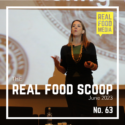By Anna Lappé, San Francisco Examiner
Even as the evidence is clear that their products are making us sick, soda giants — Coke, Pepsi, Dr Pepper, Snapple — are spending millions to try to stop us from doing anything about it.
How sick? When UCLA published its findings of diabetes and pre-diabetes rates last year, the figures shocked the state: 55 percent of Californians are pre-diabetic or diabetic, the researchers found. Half of us. Nationally, the figures are not much better: The Centers for Disease Control and Prevention reports that a child born today has a 1-in-3 chance of developing diabetes in their lifetime, if these trends remain unchanged. What’s more, the dietary patterns linked to this rise in preventable diabetes — particularly the consumption of sugary drinks — are implicated in other chronic illnesses, too, including heart disease, liver disease and other metabolic conditions. Diabetes alone costs the country $245 billion today. It’s not hyperbole to call this a national crisis.
Communities around the country are alarmed and want solutions. They are increasingly focused on policies to discourage consumption of sugary drinks — the single largest source of sugar in our diets — and raise revenue for health education and diabetes prevention programs. Placing an excise tax on sugar-sweetened drinks of a penny or more per fluid ounce is one such approach. In the wake of the first two U.S. cities passing a sugary drinks tax — Berkeley, then Philadelphia — San Francisco, Oakland, Albany, Calif., and Boulder, Colo., all have versions of this tax on their ballots.
Instead of acknowledging tax proposals like these as a commonsense approach to a public health crisis, the beverage industry is fighting back. Big Soda has spent millions to try to control the debate on these taxes and fight the communities proposing them. Since 2009, Big Soda’s big players — the industry trade group, American Beverage Association, and Coca-Cola and PepsiCo — have spent a whopping $67 million to try to defeat these taxes in 19 cities and states, according to analysis from the Center for Science in the Public Interest.
As part of these campaigns, the trade group has also been busy promoting its products and deflecting concern about sugary drinks. Every year, beverage giants spend billions marketing sugary drinks, especially targeting black, Hispanic and young consumers. And just as the sugar industry was caught trying to shift blame for heart disease to fat, Coca-Cola has for decades been trying to shift blame for chronic illnesses like diabetes from consuming their products to a lack of exercise. Last year, the company was exposed for funding a new (and now disbanded) front group, the Global Energy Balance Network, promoting just such message.
Big Soda is bullying us with their billions, using their pocketbook and political influence to thwart popular will. When my city of Berkeley took on Big Soda and put a sugary drink tax on the ballot in 2014, we were bombarded with these industry bullying tactics — the same ones now being used everywhere communities are embracing these public health policies. We were told the tax would be too hard to implement; that it wouldn’t make a difference to people’s health. We heard these industry-sponsored messages in ads on bus stops, public transit hubs, mailers on our doorsteps — even before movies in our theaters.
In the end, Big Soda dumped $2.4 million in this city of 117,000, about $400 for everyone who voted against the tax. But despite being heavily outspent, we the people won — with a people-powered 76.2 percent of the vote — and the tax now generates about $1.5 million a year for popular nutrition and education programs and has decreased consumption. According to one survey, the city’s low-income residents report a 21 percent reduction in soda consumption post-tax.
With sugary drinks taxes on the ballot beyond Berkeley, Big Soda is spending big again: The industry has banked $9.5 million on TV ads in San Francisco alone. They’re also spending millions on legal action, hiring white shoe law firms, including some of the same firms that have worked with the worst bullies out there: the tobacco industry.
When Big Soda didn’t like that Berkeley put a soda tax on the ballot, the industry hired someone to move to Berkeley to sue the city, claiming the proposed language for the tax was unfair. (They lost).
When Big Soda didn’t like that enough Boulder residents had signed a petition to put a sugary drink tax on the ballot there, the industry trade group tried to stop the policy with bogus legal complaints about the petition process. (They lost).
When Big Soda didn’t like that Oakland residents would have clear ballot language calling this city’s soda tax a, um, “soda tax,” they fought in court to try muddy the language and confuse voters. (They lost).
As public-health minded nutritionists, doctors, community activists and parents are coming together in ever greater numbers to take on one of the biggest culprits of chronic disease — Big Soda — the industry is responding in force. It’s time to expose this industry for its bullying tactics. Bullies aren’t welcome on the schoolyard and they certainly shouldn’t be welcome in our city halls, influencing promising public health policies, either.
Originally published in the San Francisco Examiner
Photo by Andy Schultz



